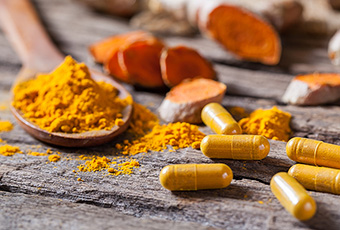Nutritional tips for autoimmune conditions

As an Integrative Nutritionist, founder of Unspoken Nutrition, and patient advocate, Neeyaz Zolfaghari is dedicated to helping individuals with autoimmune conditions find and create harmony with their daily habits to support well-being and health.
After the success of her recent Ask the Expert focused on nutrition for psoriasis, Zolfaghari returned to Inspire for another Ask the Expert. This time, the discussion was broadened to include other autoimmune conditions. Read highlights from the discussion below or read the entire discussion in the Autoimmune Disease Support Community.
Question: Diet seems to be the BIGGEST obstacle for people. It's mentioned frequently. I feel many people get overwhelmed before they start. What is a simple thing a person may do—first step—to get them on their journey?
Zolfaghari: I totally agree, approaching diet and nutrition practices is very overwhelming—especially in this day in age where social media loves to add noise and confusion for many. I myself, being a professional in the field, am often confused too! I love to offer this simple practice to my clients who are first starting out—EAT THE RAINBOW. Add in more fruits and vegetables to your diet, make your fridge a display of of the rainbow with a variety of both. This automatically encourages you to intake more nutrients, vitamins and minerals and a beautiful colorful plate is inviting to the eye and makes for a more exciting meal. :)
Question: What kind of foods or supplements do you recommend for Graves' and thyroid eye disease (TED)?
Zolfaghari: Graves' and TED both respond really well to an anti-inflammatory (also known to be Mediterranean) style diet. One that is full of color from fruits and vegetables, lean protein such as chicken and fish (red meat periodically, I'd say 1x a week a really high quality source), fatty fish especially those that fall into SMASH (sardines, mackarel, anchovies, salmon and herring), legumes, nuts and seeds, healthy fats from olive oil and avocado. This style of eating is not only feasible for many, sustainable long term, it also is very nutrient dense meaning that you're getting all the necessary nutrients. As far as supplementation, I always say "test, don't guess." Ask your Doctor or healthcare provider to run a lab for you to check the more vital nutrients that are often deficient for those with Graves' and/or TED. These include vitamin D (ideally 60-80 ng/mL), vitamin A, B vitamins, glutathione, magnesium, zinc, selenium, iodine. I recommend most patients to take an omega or fish oil supplement, as it has been shown to help with eye health. Just be sure to stop taking it a week before any blood test, as it can skew the results. Selenium and vitamin D help slow the progression of TED, so again test to see where your values are and then aim to get the necessary amounts from food first then supplements.
Question: What is the link between vitamin D and autoimmune disease? I've read that vitamin D can help, but I've also read that it can exacerbate symptoms. Can you shed some light on this?
Zolfaghari: Low levels of vitamin D (specifically 25-OH) have been associated with an increased risk of developing immune related diseases, such as autoimmune disease. I think the confusion rather lies in that when someone has low levels of vitamin D and an existing autoimmune disease, the former might be a RESULT OF the disease, rather than a cause of the disease. The question then is well, what is causing vitamin D to be depleting or deficient in the first place? Is it an existing virus, a pathogen, a bacteria? This is where autoimmune management can become tricky, but testing (especially diagnostic testing) is SO valuable!
Question: My significant other and I both live with conditions—mine is fibromyalgia and his chronic fatigue syndrome (from Epstein Barr Virus). What do you recommend for our daily nutrition?
Zolfaghari: Foods that I would avoid is much shorter than the foods you can enjoy :) Foods to avoid include gluten, food additives (such as coloring and gums) and processed foods. The more variety of fruits, vegetables, gluten-free grains, the more nutrient dense your nutrition intake will be and that's beneficial on its own! If you are symptomatic, I'd recommend working with a nutritional expert on doing a low FODMAP diet for a few weeks to help reduce the severity of your symptoms. If you're just wanting guidance on sustainable nutrition options, then I hope the above is helpful.
Question: As a patient on a gluten-free diet, what diet would you recommend I follow to help protect the functions of the liver and kidney? Would a supplement, such as a protein powder, be advisable to take at this time?
Zolfaghari: As for nutrition recommendations for the liver and kidneys:
1) Stay hydrated to support kidney function and flush toxins.
2) Limit salt intake, as excessive salt can contribute to high blood pressure, which is a risk factor for kidney disease.
3) Limit processed foods and focus on fresh, whole foods.
4) Include sources of healthy fats such as avocados, nuts, seeds and olive oil.
5) To answer your question about protein and protein powder: Keep a moderate intake of protein, because too much can strain the kidneys.
6) Limit sugar and refined carbohydrates, to protect the liver.
7) If you drink alcohol, keep a moderate to low consumption.
Disclaimer
Member comments have been lightly edited for length and clarity. This content is for general informational purposes only and does not necessarily reflect the views and opinions of any organization or individual. The content should not be used as a substitute for professional medical advice, diagnosis, or treatment. Please consult your healthcare provider about any questions you may have regarding a medical condition.




